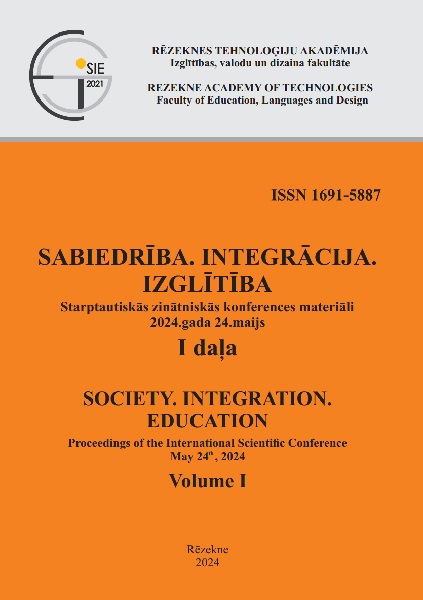CHALLENGES AND PERSPECTIVES IN TRAINING TEACHERS FOR ELEMENTARY SCHOOL NON-FORMAL EDUCATION IN CONTEMPORARY CHINA
DOI:
https://doi.org/10.17770/sie2024vol1.7814Keywords:
elementary education, non-formal education,PR China, primary education, teacher training programsAbstract
China has seen significant changes in its educational landscape recently, with a growing focus on holistic education for primary school students. Alongside formal schooling, non-formal education has become increasingly important, seen as a vital supplement to traditional classroom learning. However, the Chinese government perceives the widespread enthusiasm among parents for non-formal education as a negative trend, hindering positive qualitative changes in formal education. There are concerns about the lack of control, particularly regarding ideological influence, educator training, and service quality within the non-formal education sector, which also involves substantial financial investment. This article, drawing from publicly available sources, assesses the current state of China's non-formal education sector and examines the measures undertaken by the government in the past five years to enhance the quality of educational services. Additionally, it explores the future prospects of non-formal education in China within the context of policies aimed at reducing student burdens and improving educational service quality. The focus of the study is on primary and elementary school students, as this age group constitutes the primary target audience for non-formal educational opportunities in modern China.
References
Chinese education online. (2022). Pedagogical internship practice. Retrieved from https://www.cnrencai.com/shixijianding/1783895.html (in Chinese)
Connor, D. (2020) Teaching in China: Public Vs Private Schools. Retrieved from: https://chinabyteaching.com/teaching-in-china-public-vs-private-schools/
Deloitte research. (2022). China Education Development 2021 Report. Retrieved from https://www2.deloitte.com/cn/zh/pages/technology-media-and-telecommunications/articles/education-development-report-2021.html (in Chinese)
Fang, X. (2019). Seventy Years of Private Higher Education Development in China: From the Perspective of the Evolution of Government-Market Relations. Higher Education Research, 9, 10–19. (in Chinese)
Gong, Sh. (2016). China to allow for-profit schools, except in compulsory education. Official site of British Council. Retrieved from: https://www.lexology.com/library/detail.aspx?g=49872ee5-e5a8-46ee-ad77-9d25c13121b7
Guangzhou Provincial Employment Bureau. (2022). Advice on the organization of teaching internships. Retrieved from: https://www.f132.com/jiaoxueshixibaogao/ (in Chinese)
Huang, H. (2021). Perspectives on Education Hotspots: Increasing Oversight of the Online Education Industry and Improving the Information Literacy of Elementary and Middle School Teachers. China Teachers Daily. Retrieved from https://www.edu.cn/info/zt/lhxxh/202103/t20210304_2080753.shtml
International School Consortium. (2024). International schools in China. Retrieved from https://ldi.global/isc
Lan, J. (2019). Non-formal education: close integration of education, training and development: strategies for solving the problems of education in our society. Vocational and technical education, 10, 13-21. (in Chinese)
News of education science. (2022). Norms of a teacher's pedagogical internship. Retrieved from https://www.jy135.com/jiaoxuexinde/605305.html (in Chinese)
Shi, J., Sha, J. (2018). Bibliometric analysis of "non-formal education" based on the database of CNKI journals. Chinese education online. Retrieved from: https://www.cnki.com.cn/Article/CJFDTotal-JYUX201810013.htm (in Chinese)
State Council of the Peoples Republic of China. (2015). Law of the People's Republic of China on Compulsory Education. Retrieved from: http://www.gov.cn/guoqing/2021-10/29/content_5647617.htm (in Chinese)
State Council of the Peoples Republic of China. (2021). Regulations on the Implementation of the Law of the People's Republic of China on Promotion of Private Education Retrieved from: http://www.gov.cn/zhengce/content/2021-05/14/content_5606463.htm (in Chinese)
Yu, H., Wu, D. (2020). A study on online learning of university students and the use of mobile applications. Report on the attitude to education during the epidemic. Experience and final technologies, 11, 13–17 (in Chinese)






